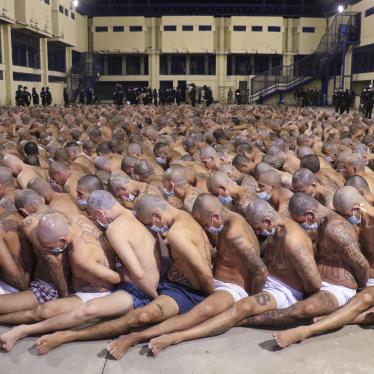(London) – The Burundian government should strengthen its support for the recently established National Independent Human Rights Commission, Amnesty International, the East and Horn of Africa Human Rights Defenders Project, and Human Rights Watch said today. Government support for the commission is especially important because the United Nations Human Rights Council has prematurely terminated the mandate of the independent expert on the human rights situation in Burundi, the groups said.
The termination of the independent expert’s mandate by the Human Rights Council on September 30, 2011, strikes a blow to independent reporting on human rights in Burundi at a critical time, as politically motivated killings committed with impunity are on the rise. The Government of Burundi and the African Group at the UN Human Rights Council had repeatedly obstructed and postponed reporting by the independent expert to the Council. As a result, the independent expert had been unable to report to the Council between September 2008 and June 2011, in contradiction of a broadly established practice of annual reporting.
Burundi’s newly established National Independent Human Rights Commission (CNIDH) has shown promising signs since June, when its members were sworn in, but it is not yet accredited by the International Coordinating Committee of National Human Rights Institutions, which assesses compliance of national human rights institutions with the standards known as the Paris Principles. The CNIDH needs greater financial support from the Burundian government and donor governments to investigate and report on human rights violations effectively.
The Burundian government should also swiftly implement the independent expert’s June recommendations to combat impunity and respect freedom of expression. The organizations consider these measures essential to halt the killings and to end restrictions on media coverage of incidents of violence.
Tension has increased in Burundi in recent weeks. A massacre at Gatumba on September 18 resulted in between 30 and 40 deaths, the largest number of victims in one incident in recent years. The circumstances of the massacre, as well as the identity of those responsible, are not yet confirmed. Several current or former members of the opposition National Liberation Forces (FNL) were killed in July and August; others are in hiding after receiving threats.
The government imposed restrictions on the media following the Gatumba killings. On September 20, Burundi’s National Security Council ordered journalists not to publish, comment on, or analyze information on the ongoing investigations into the massacre and other cases under investigation. This media blackout severely curtails freedom of expression. It follows repeated judicial summonses and intimidation of prominent journalists and civil society activists over recent months.
The independent expert, in his June report, called on the Burundian government to give national commissions of inquiry sufficient resources to operate effectively or else to investigate and prosecute cases through the normal justice system. Yet months after their creation, several commissions of inquiry set up by the Burundian government to investigate extrajudicial executions and human rights violations before, during, and after the 2010 elections have still not published their findings. Nor have there been any successful prosecutions for these crimes. The Burundian government should ensure that the commission of inquiry into the recent Gatumba killings reports publicly on its findings. Any alleged perpetrators identified by the commission must be prosecuted.
Amnesty International, the East and Horn of Africa Human Rights Defenders Project, and Human Rights Watch call on the Burundian government to:
- Provide adequate financial support for the National Independent Human Rights Commission;
- Investigate and prosecute those responsible for politically motivated killings, including the Gatumba killings;
- Publish the findings of recent commissions of inquiry into extra-judicial executions and human rights violations committed before, during and after the 2010 elections;
- Allow journalists to work freely, including by lifting the order not to report on the Gatumba killings and other cases under investigation; and
- Keep the UN Human Rights Council regularly informed on steps taken to implement the independent expert’s recommendations.
Background
At the Human Rights Council (HRC) in June and September 2011, the Government of Burundi, with the support of other African countries, opposed continuing the independent expert’s mandate. The mandate had last been extended with HRC resolution 9/19 in September 2008, which provided that the mandate would continue until an independent national human rights commission had been established in Burundi.
The resolution also invited the independent expert to report on his activities to the HRC at the session following the commission’s establishment. A resolution introduced by Senegal on behalf of the African Group and adopted by the HRC on September 30, 2011, interpreted this to mean that the mandate had expired after the independent expert reported to the Human Rights Council in June 2011, following the creation of the National Human Rights Commission in Burundi and the appointment of commissioners.
Accreditation of national human rights bodies in compliance with the Paris Principles, a set of standards measuring their effectiveness and independence, is carried out by the International Coordinating Committee of National Institutions for the Promotion and Protection of Human Rights (ICC). The ICC grants ‘A’ status to human rights institutions that comply fully with the Paris Principles. Once the Burundian commission applies for accreditation, the ICC will assess its compliance with the Paris Principles.





